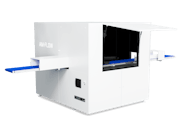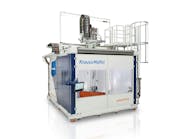There is a paradigm-shifting movement underway and you may have seen it in play or heard about it during NPE. Novatec Inc. is involved in a big way; the company has entered the Prophecy business — for predictive maintenance of vacuum pumps and central dryers.
The Baltimore-based auxiliary equipment supplier is making a major move into the market for machine wearables. It has an exclusive license from Prophecy Sensorlytics for wearables on its equipment, and officials are making it easy and accessible. A magnetic device that fits in the palm of your hand can be placed on the blower of your vacuum pump to get real-time data on the inner workings of that machine.
This technology offers a glimpse into the future and it's a great illustration of one of the biggest trends for manufacturing, that of taking part in the Internet of Things (IoT).
What is the Internet of Things? It refers to physical objects that are embedded with sensors, giving the objects the ability to communicate data through the Internet, no humans needed.
Big data. Data analytics. You've heard about it in the mainstream media and you'll likely be hearing more about it as Apple launches its first wearable, Apple Watch. "Innovation in every interaction" is one of its marketing taglines. Apple Watch will tell you everything you want to know about yourself and maybe some things you don't.
One of the more mind-blowing features of Apple Watch is something called a "taptic" engine that produces haptic feedback. The watch will tap its wearer on the wrist and will modify those taps based on the alert or notification. It will even allow the wearer to send his or her heartbeat to a friend. It's linear actuator technology that uses an embedded cardio sensor.
This is the stuff that's supposed to make us smarter—and more efficient. That is the upside. It is the consumer segment, in fact, that has made sensors within economical reach for manufacturing. We address that a bit more in this PMM story.
IoT has untold value for manufacturing operations. Global management consulting firm McKinsey & Co. has identified it as one of the disruptive, transforming technologies for manufacturing. That firm has predicted that 80 percent to 100 percent of all manufacturers will be using IoT applications by 2025. There are some companies that have already equipped entire factories with the technology.
Have you thought about it for your operation? We would like to hear from you. What if you had the capability to monitor equipment that may be hidden or overlooked in day-to-day operations? How often do you think about the maintenance? Please feel free to email me with your comments.
One of the biggest IoT concerns is the risk of a security breach, and I asked Novatec and Prophecy officials about security issues with regard to the Prophecy system, which tracks data about the health of machines.
"The data are encrypted once they are leaving (the) factory via (the) public Internet," says Dr. Biplab Pal of Prophecy.
Even if breached, the data is useless information without the sophisticated, physics-based models and mapping developed by Pal and Prophecy engineers. "Raw data has no value," Pal points out.
Also, information regarding the health of a company's machines gives little advantage, if any, to a competitor, Pal says.
If you have any concerns about cyber security risks for IoT, do your research, and ask your supplier about it.
It is intriguing to think about what else this technology can do for the plastics industry, including for injection molding and extrusion. There is value here that's only beginning to be uncovered.
Angie DeRosa, managing editor







